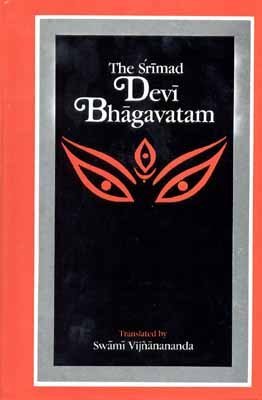The Devi Bhagavata Purana
by Swami Vijñanananda | 1921 | 545,801 words | ISBN-10: 8121505917 | ISBN-13: 9788121505918
The English translation of the Devi Bhagavata Purana. This Sanskrit work describes the Devi (Divine), the Goddess, as the foundation of the world and as identical with Brahman, the Supreme Being. The Devi Bhagavata Purana is one of the most important works in Shaktism, a branch of Hinduism focusing on the veneration of the divine feminine, along w...
Chapter 23 - On the description of the remaining hells
1-31. Nārāyaṇa said :-- O Nārada! When persons, impelled by sinful motives, always speak false at the time of giving evidence or at the time of taking or giving money, they, after their death, go to the terrible hell, named Avīci. There, from the summit of a mountain, one hundred
Yojanas high they are dropped at once down below with their heads inverted down. Here the solid ground looks like water and appears like waves. Therefore it is called Avīci, resembling like Avīci waves. Here if the sinner’s body be cut to small pieces, still he does not die; rather he gets a new body when his body is all cut to pieces. O Son of Brahmā! When a man, be he a Brāhmin, Kṣattriya, or a Vaiśya, drinks the Soma (wine) or due to inadvertence drinks wine, he is thrown into this hell. O Muni! The Yama’s servants make him drink the molten iron. When a vile person being maddened by the pride of his self-learning, birth, austerities or Vārna and Āśrama, does not pay his respect duly to his superiors, he is thrown into the Kṣārakardama hell with his head downwards. He suffers a tremendous pain there. When a man or woman out of delusion, performs the human sacrifices (where men are immolated as victims), he or she has to eat the human flesh here. Those that killed before all sorts of beasts, come after their death into this abode of Yama, all united and like butchers, cut each other’s flesh by pickaxes, etc., and drink their blood and dance and sing repeatedly. They do, in fact, what the terrible Rākṣasas do. When persons meet with the innocent persons, wishing to live in villages or forests and raise their confidence by various such means and make them attached and finally pierce them by pointed Śūlas (trident) or pointed swords and kill them as if they were ordinary play things, they are taken after their death by the Yama dūtas and thrown into Śūlādi Naraka (pierced by Śūlas). They are pierced there by Śūlas and become overpowered by hunger and thirst. Herons and cranes, with their sharp beaks hunt after them to and fro. Thus tormented, they remember all their sins done in their previous lives. Those who follow stray paths and trouble the other beings as the serpents do, they fall into the Dandaśūka hell. Here worms with five faces and seven faces come from all sides and eat them as a fierce serpent devours a mouse. Those who confine persons in dark holes, a dark room or a dark cave they are taken by the Death servants with their arms uplifted and confined to similar dark caves, filled with poison, fire and smoke. When a Brāhmin householder, seeing a guest coming to his house in a reasonable (proper) time, casts a furious sinful glance at him as if to burn him, the Death’s attendants, the herons with thunderbolt like beaks, the crows and the Vaṭas and other birds and very fierce vultures all come and forcibly take out the eyes of that person who committed the aforesaid sins. When person elated with vanity of his riches become too haughty and doubt over their Gurus and when their hearts and faces wither withal away, as it were, with the thoughts of their income and expenditure, and being always unhappy, hoard up money always like the Brahmā Piśācas, the
Death’s officers take them for these Karmas to Sūcimukha Narakas and pierce all over his body with pins, as a tailor does with his cloth. O Devarṣi! True, sinful persons thus suffer hundred thousand hells. All these are very painful and tormenting. Out of these the abovenamed twenty hells give the greatest sufferings. O Devarṣi! The sinners suffer various pains in hells and virtuous persons go to the several spheres where all sorts of happinesses and pleasures reign. O Maharṣi! I have described to you many forms of practising one’s Sva Dharma; yet know this verily that the worship of the Devī’s Gross Form and of Her Virāt Form is the Chief Dharma of all the persons. By worshipping the Devī, the persons have not to go to the hells. In fact, when the Devī Bhagavatī is worshipped, She Herself arranges for crossing the person to the other shore of this ocean of transmigration of existence.
Here ends the Twenty-third Chapter of the Eighth Book on the description of the remaining hells in the Mahā Purāṇam Śrī Mad Devī Bhāgavatam, of 18,000 verses, by Maharṣi Veda Vyāsa.
